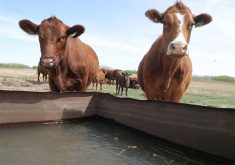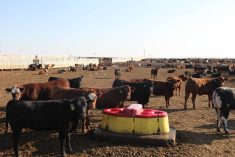BANFF, Alta. – Increased concern over antibiotics that are fed to meat
animals has directed research into alternative treatments.
One alternative being explored for hogs is probiotics, live microbial
feed supplements that stimulate animals’ intestinal activity and fight
off harmful bacteria.
Probiotics have been known since Pliny, the Roman philosopher who
recommended fermented milk to soothe an upset stomach. Some researchers
say probiotics are only one tool for maintaining animal health.
Past claims about the success of probiotics in treating illness or
Read Also

Dry summer conditions can lead to poor water quality for livestock
Drought conditions in the Prairies has led to an decrease in water quality, and producers are being advised to closely monitor water quality for their animals.
improving growth were exaggerated, said Mike Stiles, professor emeritus
from the University of Alberta who has continued his research with a
private company in Edmonton.
“The gut microflora is poorly understood and understudied.”
He said science is not sure how bacteria work or how they interact with
other microbes in the gastrointestinal tract.
“Adding microbes to the gut may have little influence on flora that is
present.”
Some bacteria may actually be harmful.
Stiles’s company is researching bacteriocins that kill or inhibit
growth of closely related bacteria. Lactic acid bacteria, one of the
bacteriocins being studied, has the potential to combat campylobacter,
E. coli and salmonella.
Part of the research is aimed at genetically altering some of these
bacteria, but so far the results have been unstable and slow to produce
positive effects.
Stiles is concerned the public may not accept genetically altered
bacteria as an alternative to antibiotics. Bacteria also have the
potential to develop resistance to probiotics.

















